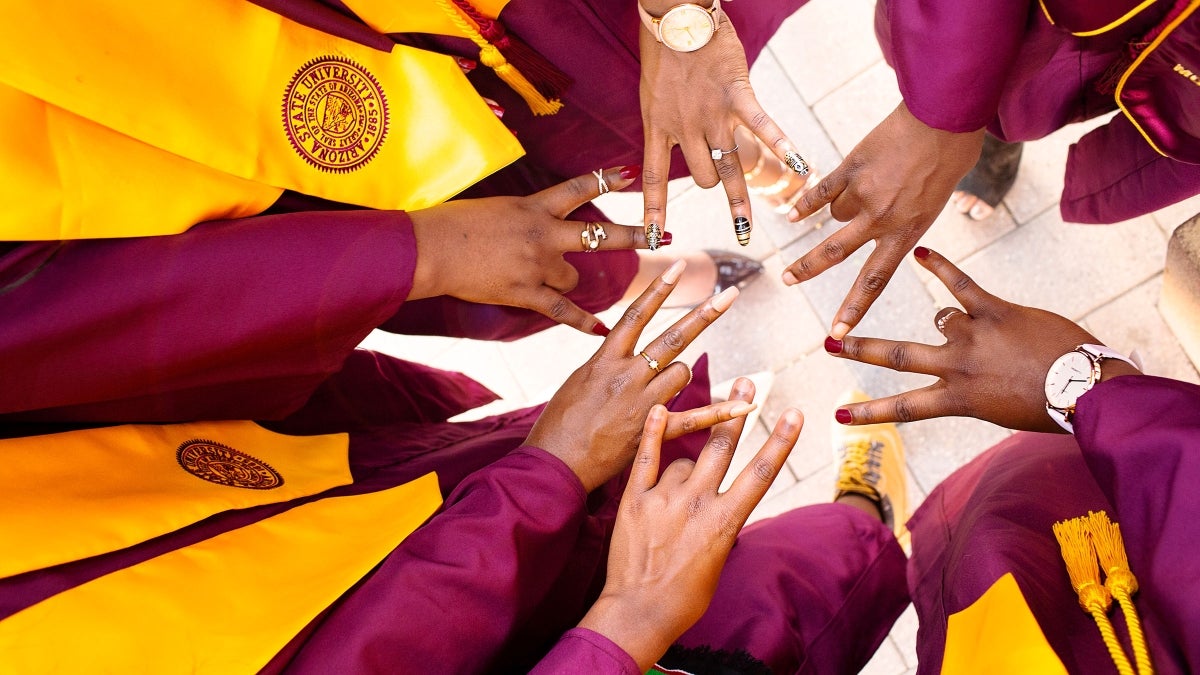ASU outpaces ambitious graduation goals as part of national coalition of innovative universities

The University Innovation Alliance (UIA), a national consortium of innovative public research universities working to improve student success, announced that it has exceeded the graduation targets set during President Barack Obama’s College Opportunity Summit.
Arizona State University is a founding member of the UIA, which launched in 2014. At its launch, the UIA presidents set a goal to graduate an additional 68,000 students above their baseline projections over the course of 10 years, and they committed that half of those students graduated would come from low-income backgrounds. Six years in, the UIA schools have exceeded that goal by graduating an additional 73,573 students, increasing the number of graduates from low-income backgrounds by 36% and graduates of color by 73%. The institutions are now projected to graduate a total of 136,000 students by 2023 — double the original goal launched at the White House College Opportunity Day of Action in 2014.
Since the launch of the UIA, ASU has graduated an additional 21,128 students above its baseline projections — including increasing the number of low-income graduates by 63.2% and graduates of color by 93.3%.
“At ASU we’ve shut off the force fields that have traditionally kept people out of higher education,” said Michael Crow, ASU president and chair of the UIA. “We’re accelerating our research, scholarship and mission, manufacturing all these different pathways to success and to the future. The university is designed to provide students from every family background and every financial situation access to world-class faculty, learning and experiences, so they can move forward and do almost anything with their life.”
A number of ASU programs and innovations that focus on first-year student retention are having a positive effect on the university’s graduation rates. The First Year Success Center supports new students as they navigate through the critical first year of college, with coaches offering personalized advice on academics, getting involved in campus activities, adjusting to college life, securing financial aid and more. In LEAD, first-year students are grouped into cohorts and take classes together throughout the year, learning crucial skills while building strong relationships with their peers. And Sunny the Chatbot, launched in 2018, answers student questions via text, in English or Spanish, about admissions deadlines, move-in, meal plans and other incoming Sun Devils' frequently asked questions.
As part of the alliance’s next phase of work, campuses will focus on eliminating disparities in educational outcomes based on race, ethnicity, income, generational status, gender and geography, all the while continuing to produce more graduates, innovate together, share data transparently and hold down their costs.
Since its founding, the alliance has worked together to test, iterate and scale proven student success initiatives across its network. To date, its work has included the scaling of predictive analytics, proactive advising, completion grants, a student success chatbot and new career services practices across the member institutions. Most recently, the alliance released its Completion Grant Playbook, based on its pilot to provide $3.6 million worth of small grants to help nearly 5,000 students complete their degree or remain enrolled in the university.
“ASU and its leadership have been a critical partner in our efforts to advance an ambitious agenda on the behalf of students,” UIA Executive Director Bridget Burns said. “The university should be very proud of its progress to date, but we all know there’s more work to be done and we look forward to this next phase of collaboration and innovation.”
To read more about the University Innovation Alliance’s work to date, visit theuia.org.
Top photo from 2019 spring commencement by Courtney Lively Photography
More Arts, humanities and education
AI literacy course prepares ASU students to set cultural norms for new technology
As the use of artificial intelligence spreads rapidly to every discipline at Arizona State University, it’s essential for students to understand how to ethically wield this powerful technology.Lance…

Grand Canyon National Park superintendent visits ASU, shares about efforts to welcome Indigenous voices back into the park
There are 11 tribes who have historic connections to the land and resources in the Grand Canyon National Park. Sadly, when the park was created, many were forced from those lands, sometimes at…
ASU film professor part of 'Cyberpunk' exhibit at Academy Museum in LA
Arizona State University filmmaker Alex Rivera sees cyberpunk as a perfect vehicle to represent the Latino experience.Cyberpunk is a subgenre of science fiction that explores the intersection of…